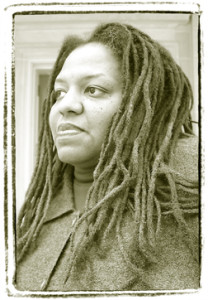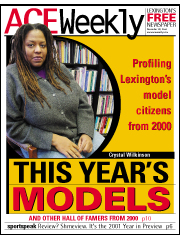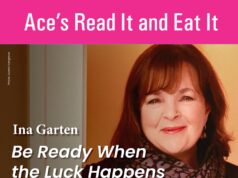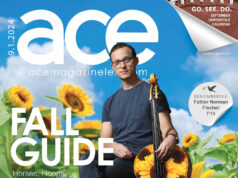Quiet Spirit
Teaching. Writing. Organizing. Crystal Wilkinson is the total community package
by Phyllis Sargent
 After all the millennium hype, the ACE Model of the Year 2000 has got to be a real stunner, right? Well, yes, and no. Although Crystal Wilkinson is a stunning individual – in too many capacities to count – it’s her steady, quiet reserve that stands out in a community usually characterized by flash.
After all the millennium hype, the ACE Model of the Year 2000 has got to be a real stunner, right? Well, yes, and no. Although Crystal Wilkinson is a stunning individual – in too many capacities to count – it’s her steady, quiet reserve that stands out in a community usually characterized by flash.
Assistant Director of the Carnegie Center for Learning and Literacy, award-winning author, creative writing teacher, and omnipresent volunteer. When asked what drives her towards those type of projects, she explains, “I have to be happy, and I have to be connected to people in some way.”
Teaching is one of the main themes in Wilkinson’s service, whether leading a writing workshop at the Carnegie Center, or teaching a creative writing class at the Governor’s School for the Arts program, or helping kids at the annual Roots and Heritage Festival.
It was Wilkinson’s grandmother, who raised her from when she was a weeks-old baby, that started the whole thing. “My grandmother wanted to be a schoolteacher. And because of the era she grew up in, she was discouraged…but I think there was always a piece of her that wanted to be a schoolteacher, so I got the advantages of all the teaching energies that she had.”
On her teaching, Wilkinson states, “I like to just be a part of the writing community that I’m trying to set up for my students. And then go from there and learn from an organic place, not the other way around.”
Besides her work for the Carnegie Center, she was faculty chair for the Governor’s School for the Arts this past summer, run by her friend Frank X Walker (last year’s Model). Since a reading at Alfalfa’s Restaurant, the two have worked together on the Roots and Heritage Festival, and are members of the Affrilachian Poets group, where Wilkinson feels she found a home. “Even after I left college, I still felt there was nobody like me (black or white); I didn’t fit in. I wasn’t meeting other country black folk who knew the value of homemade biscuits or rhubarb pie.”
She’s modest as she ticks off the year’s impressive list of accomplishments. “I did a special workshop this year with kids. I’ve also worked with the Black Achievers, and started a Young Women’s Writer’s Series here [Carnegie Center]. [The students] got to spend time with such writers as Nikki Finney, Kim Edwards, Lisa Kendrick, and Rhea Lehman. The Center also hosts the KY Women’s Conference, and I am on that committee. I also do publicity and planning for the Women’s Board [Louisville].”
Of course, there is her volunteer work, where she also involves her children. “There are certain things that I always do. Like me and my daughters [12 year old twins] always volunteer for the KY Christmas Chorus. I’ve also worked with Mary Ellis Smith for her Christmas Party that she has for the kids over at Carver School. I went and did a writing workshop with the Family Care Center and the young women there.”
 On her origins as a writer she says, “I just read voraciously, and if I’d read all my books…I guess that’s what crossed over into the writing, because then I’d start making up stories. That’s kind of how all that got started.” All “that” refers to Wilkinson’s eventual debut as a published author, with Blackberries, Blackberries (released by Toby Press this year), a collection of short stories (profiled in Ace, July 6, 2000). She was invited this year to the Sixth International Conference on the Short Story in English (Iowa), and earned an honorable mention in Francis Ford Coppolla’s Zoetrope: All Story Fiction Contest.
On her origins as a writer she says, “I just read voraciously, and if I’d read all my books…I guess that’s what crossed over into the writing, because then I’d start making up stories. That’s kind of how all that got started.” All “that” refers to Wilkinson’s eventual debut as a published author, with Blackberries, Blackberries (released by Toby Press this year), a collection of short stories (profiled in Ace, July 6, 2000). She was invited this year to the Sixth International Conference on the Short Story in English (Iowa), and earned an honorable mention in Francis Ford Coppolla’s Zoetrope: All Story Fiction Contest.
As one of three African-Americans in her hometown community, Wilkinson’s writing grew out of her place here in Kentucky, which for her was in Casey County. She reflects, “My world was one of isolation in a number of ways, and I think that kind of nurtured me as a writer. I had a very vivid imagination. Books, of course, were my playmates. But I also did weird things like talking to trees. They had this construction project going on, and I did this whole little ceremony where I apologized to the trees for them being cut down.”
Wilkinson did not grow up unscathed by racism. She remembers, “High school was hard for me. I remember one particular boy who lived on my same street, that was his thing, every day he had something to say. That bothered me a lot. But I think the advantage of all that is that I didn’t have anything to compare it to.”
When asked about her decision to go to college, she promptly replies, “I could see further than the end of the road. Part of it was imagination and fascination, things that I had made up because I had such a vivid imagination, because I was a writer in the making. But part of it was because I had been introduced, through reading, to a world outside my own. Now of course, I romanticized the whole thing, and none of it was like I thought is was going to be, but that’s what got me there.”
She talks freely to young women about her own experience of having a son while in her freshman year. She emphasizes,”But I never thought about quitting. I never even thought about not finishing school.”
Finish school she did, with a journalism degree from EKU, but then noting, “It took me years to realize that kind of writing, although I liked it, it didn’t feed my creative spirit, like I needed my creative spirit to be fed.” Next were stints at LFUCG, as Public Information Officer, then into Public Relations at the Hope Center and Midway College. This is the area Wilkinson feels she thrives in.
After assisting with putting together a community-wide Kwaanza reading at the Carnegie Center this past week, the coming year looks to be just as busy as the last, kicking off with teaching workshops at the Carnegie Center, and invitations to the Kentucky Book Fair (featured writer) and the EKU Creative Writing Conference (presenter) already in the works.
And there is always the writer. Asked about plans for a new book, she responds, “I am working on some stuff, I am still writing stories. I have been very pleased, because I am still the same old person, and I can’t be any other way than what I am.”







